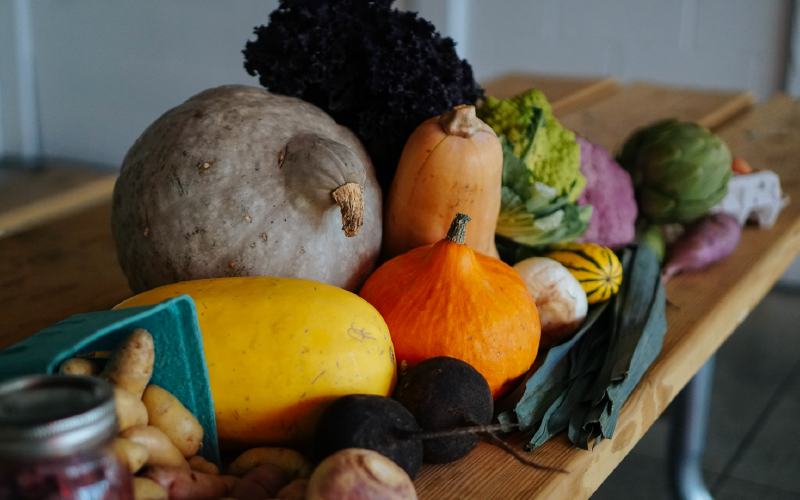Strolling the streets of Denver, you may notice many figures behind many restaurant windows enjoying carefully crafted plates. It takes a mountain of effort not to succumb to the desires of your roaring stomach, conspiring with your brain to create phantom smells, luring you inside for a bite.
Fortunately, or perhaps unfortunate for your stomach, Colorado continues to accelerate its collective appetite for a culinary culture that blends creativity and diversity with sustainability. During the last weekend of January, TEDxMileHigh and Protect What’s Next had the pleasure of organizing an adventure tapping into the future of Colorado’s food culture. Chef Kelly and Erika Whitaker (co-owners of Basta), Chef Marilyn Kakudo, Chef Cody Taft, and Farmer Grant Hamil led our aspiring chefs on a culinary adventure.

Set in the backdrop of the RiNo Art District, Comal Heritage Food Incubator hosted the many inspiring chefs. In a space boasting bright windows and a neon pink sign in the back, the young chefs-in-training were presented with a tour of the produce grown in Colorado’s very own backyard. Grant Hamil, Lyons Farmette Farm Manager, inspired a series of curious gazes when he revealed a variety of vegetables, such as spaghetti squash, purple cauliflower, and the fractal wonder of Romanesco broccoli. With a mission to support and empower the local food community on animals and environmental sustainability, Grant extolled the importance of sustaining honeybees, giving everyone a taste of his fresh made batch of honey. It prompted a student to ask, “How come the honey is all cloudy and unclear?” Grant explained that unprocessed, organic foods, which grow full with delicate vitamins and nutrients. These are stripped away through the process of sieving and heating food multiple times. With this new-found knowledge, Grant gave them a challenge: grab an unfamiliar piece of produce to take home and cook with their families.

Next, the group was given a primer on grains and flour. Together, chefs Kelly Whitaker and Cody Taft demonstrated the process of milling grains. Kelly supplied the protégés with the knowledge about how flours and grains make it from the farm to the store and the importance of biodiversity. Highlighting the importance of experimentation and fermentation, Kelly and Cody made pizza dough using whole grain double-zero (00) flour, a healthier grain compared to the white grain Italians are very fond of. Using a classic grain miller made of wood, a tool perhaps no one in the room had seen before, Cody turned the ingredient from grain to flour. Though undeniably delicious, Kelly explained that the grain strains used in most flour that traditional Italians use for pizza has been shown to be unhealthy, causing everyone to giggle when he explained, “You can’t tell Italians not to eat pizza! Go ahead and try!”

While dough fermented, Adventure Director Cate Croft directed the group into the next lesson, jokingly exclaiming “let’s jump into the knives!” Though seemingly similar, Kelly admitted he quickly learned that not all knives serve the same purpose. When he was an apprentice in East Asia, he discovered that there can be almost 40 different types of fish knives. For this adventure, he displayed his most prized tool for them to examine.
In the corner of the same table, a variety of different sauces from peach-tomato to spicy fish sauce were also waiting attention. With her history of teaching culinary and baking, Chef Marilyn Kakudo stressed the differences between various methods of preservation: keeping food from the oxidization of fats like in sauces and meats, extracting water from some foods like apples for apple chips, and even inducing benign bacteria to create cheese. With her direction, the kids were excited to participate in creating apple sauce from apple to sauce. Finished with their task or preparing the apples, the students were eager for the next project: making their own pizzas.


With a wood-fire-oven reaching temperatures close to 800˚- 1,200˚ Fahrenheit behind him, Cody illustrated the art of kneading out pizza dough. With a plethora of toppings from fresh mozzarella to basil and Marilyn’s unique sauces, both Cody and Kelly explained the histories and inspirations behind classic pizzas like the Margherita and the Hawaiian. He challenged them to find an innovative pair of flavorings because some of the best pizzas come by accident.

 Kelly’s closing remarks touched on how his desire to be a chef has an influence on community. “It’s not about cooking, it’s about hospitality. When you travel the world, what’s the best way to know the community? It’s through food.”
Kelly’s closing remarks touched on how his desire to be a chef has an influence on community. “It’s not about cooking, it’s about hospitality. When you travel the world, what’s the best way to know the community? It’s through food.”

Our culinary Adventure was hosted in partnership with Protect What’s Next. Protect What’s Next is a youth marijuana education and prevention campaign created by Denver advertising agency, Cactus, on behalf of the Colorado Department of Public Health & Environment.
Through audience research, Cactus discovered the insight that while youth don’t always believe negative health claims or immediately buy into messages about other negative consequences of using marijuana underage, youth do believe that underage marijuana use can get in the way of achieving their goals and growth.
From that insight, Cactus developed the Protect What’s Next campaign, built upon the strategy of helping youth discover and prioritize goals, while also educating them about the ways marijuana can get in the way of those goals. In that spirit, the Protect What’s Next campaign is partnering with TEDxMileHigh to create a series of Adventures to help Colorado youth discover and explore passions that could turn into exciting, long-term goals.
Stay tuned for many upcoming youth adventures at protectwhatsnext.com/adventures!


















